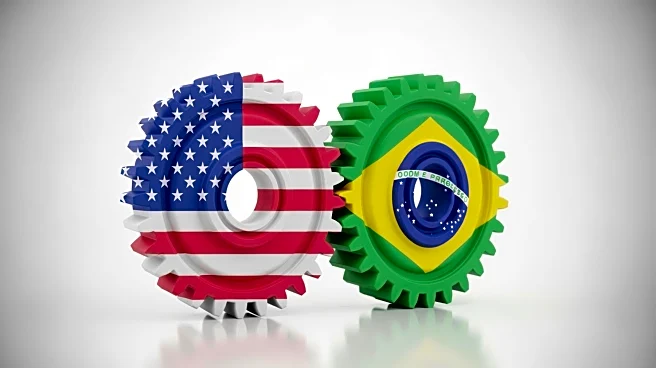What's Happening?
On July 30, President Trump signed an executive order imposing 50% tariffs on Brazilian goods, citing the country's policies and the criminal prosecution of former President Jair Bolsonaro as reasons for the action. The tariffs have significantly increased
the cost of Brazilian imports into the U.S., affecting trade relations between the two nations. Brazil's President Luiz Inácio Lula da Silva has expressed his intention to personally call President Trump if negotiations on the tariffs do not progress. Lula and Trump had previously discussed the possibility of reaching a deal during a meeting in Malaysia in October. The U.S. had a $6.8 billion trade surplus with Brazil last year, according to the U.S. Census Bureau.
Why It's Important?
The imposition of tariffs by President Trump on Brazil could have significant implications for international trade and diplomatic relations. The tariffs may lead to increased costs for U.S. consumers and businesses that rely on Brazilian imports, potentially affecting sectors such as agriculture and manufacturing. Additionally, the diplomatic tension could impact broader U.S.-Latin American relations, especially if negotiations fail to resolve the issue. President Lula's proactive approach to engage directly with President Trump highlights the importance of maintaining strong bilateral ties and the potential economic impact on Brazil's export-driven economy.
What's Next?
President Lula has indicated that he will call President Trump if negotiations do not advance, suggesting a willingness to engage in direct diplomacy to resolve the tariff issue. The Brazilian government is keen to schedule further talks, with Vice President Geraldo Alckmin and Finance Minister Fernando Haddad leading the negotiations. The outcome of these discussions could influence future trade policies and diplomatic relations between the two countries. Additionally, the Supreme Court is set to hear arguments challenging President Trump's use of the International Emergency Economic Powers Act to impose tariffs, which could have legal implications for the administration's trade strategy.
Beyond the Headlines
The tariffs imposed by President Trump on Brazil may have deeper implications for global trade dynamics and the use of economic measures as a tool for political leverage. The situation underscores the complexities of international diplomacy, where economic actions can have far-reaching consequences beyond immediate trade impacts. The legal challenge to Trump's use of emergency powers to set tariffs could also set a precedent for future administrations, potentially reshaping the balance of power between the executive branch and the judiciary in matters of international trade policy.
















